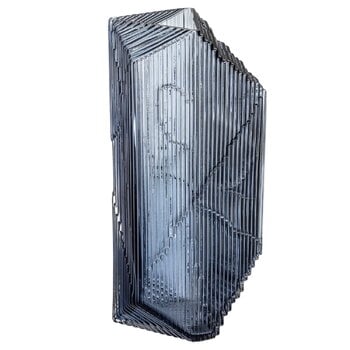The Kartta glass sculpture, designed by Santtu Mustonen for Iittala, is like a gateway to another world – the name of the work, which is Finnish for “map”, refers to an imaginary map of another reality located in our own mind. The visually enticing art glass object exudes mystique and evokes boundless fascination whether as a single statement piece or as a part of a larger art collection.
The Kartta sculptures are made using a mould technology developed by Mustonen himself, in which digital manufacturing methods are combined with more traditional metalworking. The glass sculptures are made in Finland at the Iittala glass factory, where Iittala's master glass blowers bring Mustonen’s concept to life by blowing molten glass into a metal mould, which gives the works their distinctive grooved texture. Each Kartta glass sculpture has the artist’s signature engraved on it.




